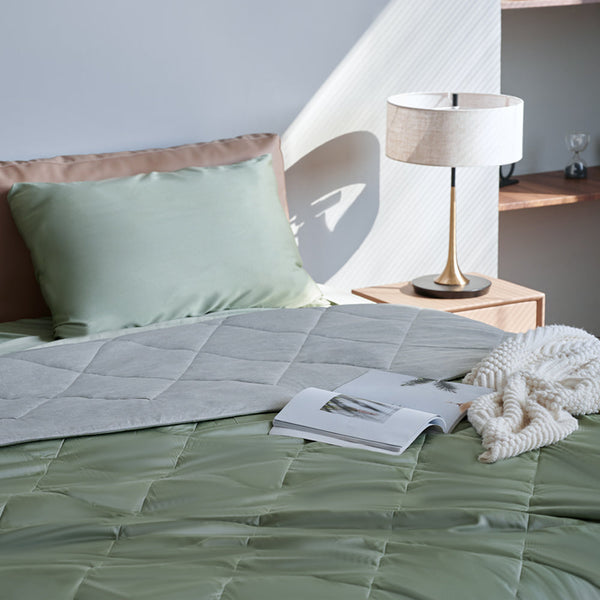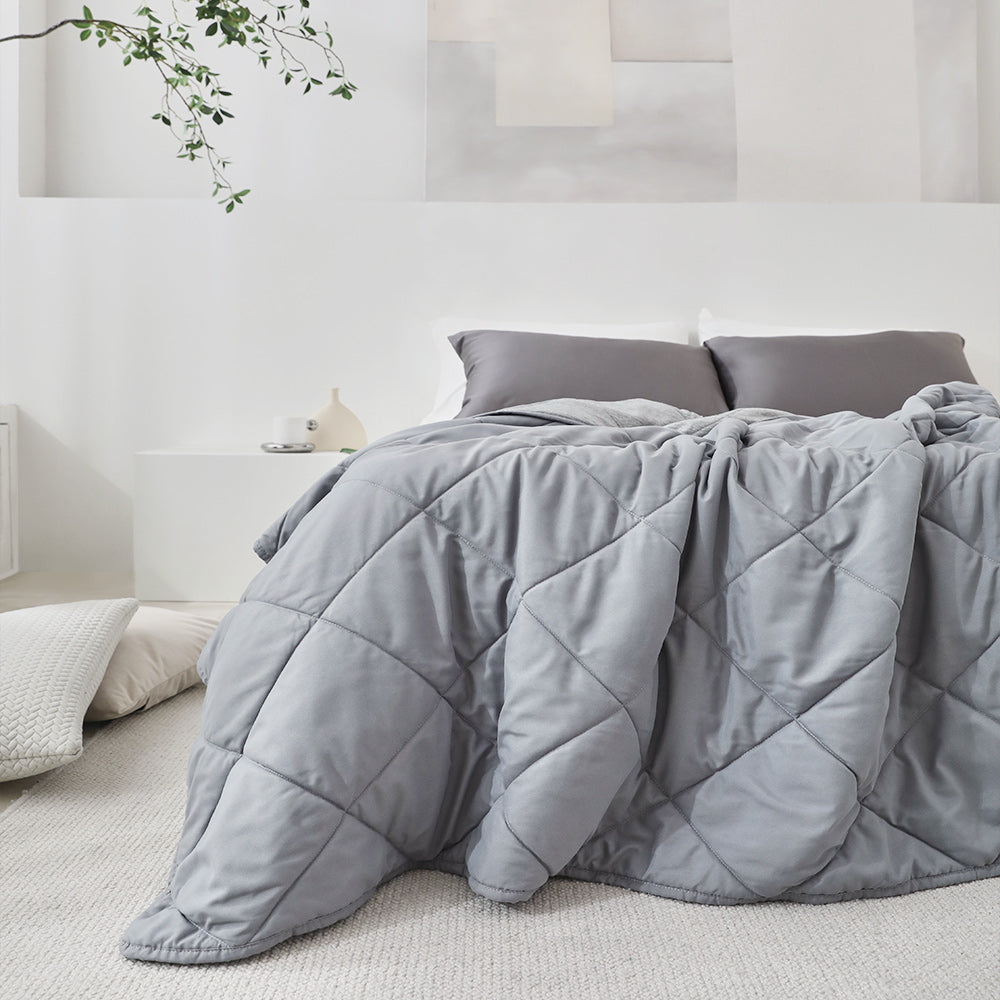Polyester is a ubiquitous contender in fabrics and textiles, celebrated for its durability, affordability, and versatility. However, as we dive deeper into sustainable living and conscious consumerism, the question arises: "Is polyester bad for you?"
This inquiry touches upon the environmental implications and their impact on personal health and well-being. As we unravel this enigma, let's explore how making informed choices can lead to a healthier lifestyle and environment.
Is Polyester Bad for You? Understanding the Impact
Polyester, a synthetic fiber derived from petroleum, is a mainstay in our wardrobes, homes, and offices. Its resilience against wrinkles and shrinkage has made it a favored material for many applications. However, the discussion around its safety and environmental footprint is gaining momentum.
The Health Perspective
From a health standpoint, several factors may come into play. The material's synthetic nature raises questions about skin sensitivity and its ability to breathe compared to natural fibers.
Polyester's potential for trapping sweat and bacteria against the skin can lead to discomfort and dermatological issues for those with sensitive skin or allergies.
Environmental Considerations
Polyester's environmental impact is multifaceted, encompassing its energy-intensive production process, reliance on fossil fuels, and challenges in recycling. Its non-biodegradable nature contributes to the growing concern over microplastic pollution, as washing polyester garments releases tiny fibers into waterways, posing a threat to aquatic life and ecosystems.
A Step Towards Healthier Alternatives
The quest for healthier, more sustainable alternatives has led to innovative products like the Zonli Home Z-Magic Cooling Comforter. This comforter exemplifies the shift towards integrating technology with natural materials to offer luxurious and eco-conscious solutions. Its moisture-wicking and machine-washable features ensure a comfortable sleep throughout the night, addressing the common pitfalls of traditional polyester bedding.
Its constant cool and silky touch, coupled with its antibacterial and hypoallergenic properties, make it a suitable option for those concerned about polyester's potential adverse health effects.
Using organic bamboo and cooling technology showcases a commitment to providing safe and environmentally friendly alternatives without compromising comfort and quality.
The Role of Innovation in Textile Sustainability
Innovation is pivotal in reshaping the textile industry's impact on health and the environment. Developing eco-friendly materials and processes is a trend and a necessary shift towards sustainability.
For instance, creating fabrics that mimic the benefits of polyester without its drawbacks, such as those found in the Zonli Home Z-Magic Cooling Comforter, represents a significant advancement in textile technology. These innovations offer a glimpse into a future where textiles contribute to a healthier planet and populace.
The Importance of Informed Choices
Making informed choices about the textiles we bring into our homes and lives is more crucial than ever. Awareness and education about the impacts of synthetic fabrics, alongside the benefits of natural and sustainable alternatives, empower consumers to make decisions that align with their values. This empowerment is not just about choosing products that are better for the environment but also about selecting items that enhance personal health and well-being.
Sustainable Practices in Textile Use and Care
Adopting sustainable practices in using and caring for textiles can further mitigate the adverse effects of polyester and other synthetics. For example, you can try washing synthetic fabrics in a mesh bag to catch microfibers, using eco-friendly laundry detergents, and choosing colder wash settings.
These tasks can significantly reduce environmental impact. Additionally, embracing a culture of repairing and repurposing textiles can extend their lifespan and minimize waste.
The Impact of Consumer Demand on Industry Practices
Consumer demand for sustainable and health-conscious textiles is a powerful force driving industry change. As more people question "Is polyester bad for you?" and seek alternatives, manufacturers and brands must prioritize sustainability and transparency in their products. This shift leads to the development of innovative materials and products and encourages industry-wide practices that are more aligned with environmental stewardship and ethical responsibility.
Why is Bamboo a Better Alternative than Polyester?

Polyester tends to trap heat and moisture against the body, leading to discomfort and disrupted sleep, particularly for hot sleepers or those in warmer climates. Furthermore, the potential for polyester to release microplastics during washing, contributing to environmental pollution, raises concerns about its ecological footprint.
In contrast, bamboo fibers offer fresh air in the world of bedding, especially for those seeking cooling comfort without synthetic materials' environmental and health downsides. Bamboo comforters, like the Zonli Home Z-Magic Cooling Comforter, have gained popularity for several compelling reasons:
Moisture-Wicking and Breathability
Bamboo fabric naturally wicks moisture away from the skin, helping to regulate body temperature and keep you dry and comfortable throughout the night. It makes bamboo an excellent material for a cooling comforter, offering a significant advantage over polyester in terms of sleep quality and comfort.
Softness and Comfort
Bamboo fibers are inherently soft, providing a silky texture that enhances the sleep experience. Unlike polyester, which can feel harsh or scratchy, bamboo comforters offer a luxurious feel, making them ideal for those with sensitive skin or preferences for softer bedding.
Antibacterial and Hypoallergenic Properties
Bamboo possesses natural antibacterial and hypoallergenic qualities, making bamboo comforters healthier for individuals prone to allergies or skin irritations. It contrasts with polyester, which can more readily harbor dust mites and other allergens.
Eco-Friendly and Sustainable
Bamboo is a highly renewable resource, growing quickly with minimal water and no pesticide needed. The production process for bamboo fibers is generally more environmentally friendly than polyester, which relies on petroleum and can contribute to pollution and resource depletion.
FAQs
Can Switching to Natural Fibers Really Make a Difference?
Switching to natural fibers significantly reduces exposure to synthetic materials, potentially improving skin health and comfort. Moreover, eco-friendly alternatives support environmental sustainability by minimizing pollution and resource depletion.
How Can I Ensure I'm Making a Health-Conscious Choice?
Researching the materials and manufacturing processes behind your textiles can provide insights into their environmental and health impacts. Looking for certifications like organic, Oeko-Tex, or GOTS can also guide you towards safer, more sustainable choices.
Do bamboo and polyester comforters require different care?
Due to their distinct material properties, bamboo and polyester comforters may require different care instructions. Bamboo comforters often need gentle washing and drying to preserve their softness and antibacterial qualities.
Polyester comforters, on the other hand, are known for their durability and may tolerate a broader range of washing and drying conditions. Always check the care label for specific instructions.
How long do bamboo comforters last compared to polyester ones?
The lifespan of bamboo and polyester comforters can vary depending on the quality of the materials and the care they receive. Generally, both types of comforters can last several years with proper care. Bamboo comforters may require more delicate handling with their natural fibres but can maintain their softness and comfort for a long time.
In Conclusion: Weaving a Healthier Future
The question, "Is polyester bad for you?" opens up a broader dialogue about our choices and their ramifications on health and the environment. We can move towards a future where comfort, health, and sustainability coexist harmoniously by considering alternatives like bamboo comforters.
Embracing these innovations benefits us personally and contributes to a more significant shift towards responsible consumerism and environmental stewardship.

